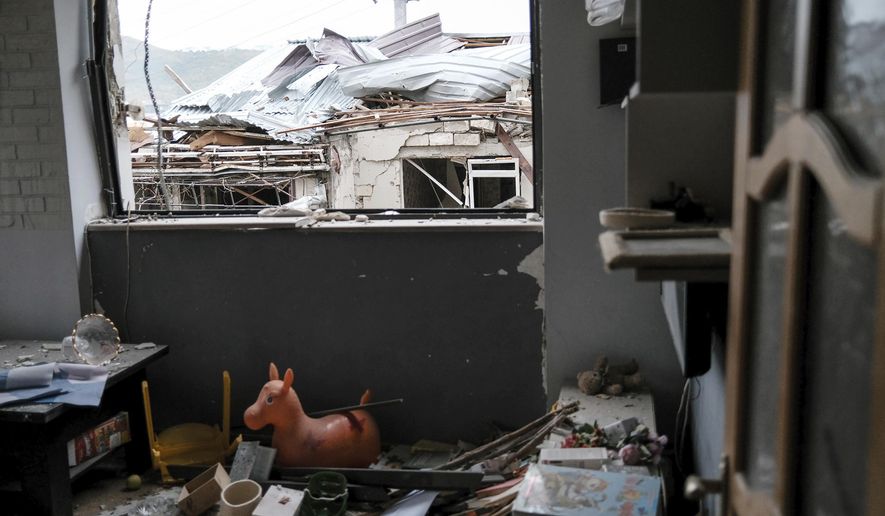BAKU, Azerbaijan (AP) - Turkey’s top diplomat traveled to Baku on Tuesday in a show of solidarity with Azerbaijan amid a flare-up in fighting over the separatist territory of Nagorno-Karabakh.
Heavy fighting between Azerbaijani and Armenian forces in the region since Sept. 27 has killed hundreds in the worst escalation of hostilities since 1994 when a truce ended a war that raged for several years. Nagorno-Karabakh lies inside Azerbaijan but has been under the control of ethnic Armenian forces backed by Armenia for more than a quarter-century.
On Tuesday, Azerbaijani authorities accused Armenia of launching missiles to target a strategic pipeline that carries Azerbaijan’s oil from the Caspian Sea to global markets. Armenian officials rejected the accusations.
The fighting involving heavy artillery, warplanes and drones has continued despite numerous international calls for a cease-fire.
Turkish Foreign Minister Mevlut Cavusoglu criticized calls for a truce and urged the international community to stand by Azerbaijan, saying that previous cease-fires had failed to end what he called Armenia’s occupation of the Azerbaijani territory.
“Let’s have a cease-fire, OK, but what will happen after that? Will you be able to tell Armenia to immediately withdraw from Azerbaijan’s territory? Or are you able to draw up a solution for it to withdraw? No,” Cavusoglu said after a meeting with his Azerbaijani counterpart, Jeyhun Bayramov. “We have supported efforts for a peaceful resolution, but Armenia has enjoyed the fruits of the occupation for 30 years.”
Azerbaijani President Ilham Aliyev, who also met with Cavusoglu, thanked Turkey for its support.
“This support inspires us, gives us additional strength and at the same time plays an important role in ensuring stability and prosperity in the region,” Aliyev said.
Armenian officials have alleged that Turkey’ was involved in the conflict and sent fighters from Syria to Azerbaijan.
Turkey has publicly backed Azerbaijan in the recent flareup of hostilities but denied sending arms or foreign fighters to the conflict zone.
Azerbaijan made a cease-fire conditional on Armenia’s withdrawal from the separatist region.
Nagorno-Karabakh was a designated autonomous region within Azerbaijan during the Soviet era. It declared its independence in the waning months of the Soviet Union, and a full-scale war that broke out after the collapse of the USSR killed an estimated 30,000 people and displaced about 1 million.
By the time the war ended in 1994, Armenian forces not only held Nagorno-Karabakh itself but also captured substantial areas outside the territory borders.
The recent fighting in Nagorno-Karabakh marks the biggest escalation in the conflict. According to Nagorno-Karabakh officials, about 220 servicemen on their side have died in the clashes. The state-run Armenian Unified Infocenter said 21 civilians have been killed in the region and 82 others wounded.
Azerbaijani authorities haven’t given details about military casualties, but said 27 civilians were killed and 141 wounded.
In Tuesday’s fighting, Azerbaijan accused Armenia of attacking several of its regions in the evening. Armenian officials said Azerbaijani forces once again targeted Nagorno-Karabakh’s capital of Stepanakert, with missile strikes.
Late Tuesday, Azerbaijani authorities accused Armenia of launching missiles to target the Baku-Tbilisi-Ceyhan oil pipeline that carries Azerbaijani crude to Turkey and on to global markets. They said the missile attack was repelled by the Azerbaijani military.
Shushan Stepanian, the spokeswoman for the Armenian Defense Ministry, denied that the Armenian forces were targeting oil and gas facilities. She added, however, that all Azerbaijani military assets used to attack Nagorno-Karabakh “will be destroyed irrespective of their location.”
—
Fraser reported from Ankara. Associated Press writers Daria Litvinova and Vladimir Isachenkov in Moscow and Avet Demourian in Yerevan, Armenia contributed to this report.




Please read our comment policy before commenting.